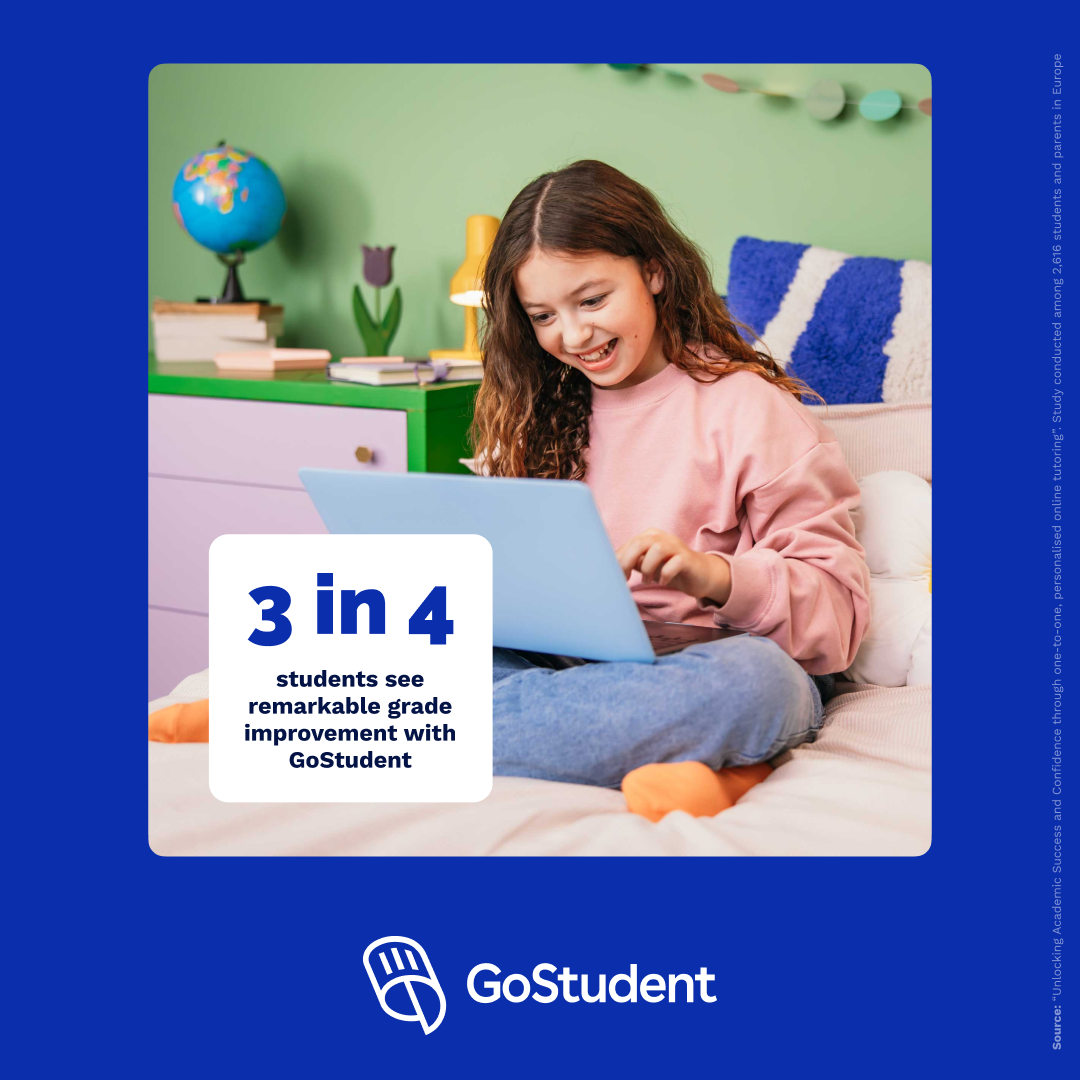Contents
- What does grade improvement mean: Is it possible?
- Maths: How to improve your child’s grades
- English: How to improve your child’s grades
- Science: How to improve your child’s grades
- Foreign languages: How to improve your child’s grades
- Is it all about grades?
What does grade improvement mean: Is it possible?
Exams can be incredibly daunting and stressful for children, making it challenging for students who have fallen behind to catch up and improve their grades by themselves. Fortunately, there are lots of ways children can recover academically, from personalised tutoring to effective study hacks. We’ve shared our top tips with you here so you can help support your child.
Personalised Tutoring Drives Academic Success
A comprehensive independent study conducted by Dr. Tricia Thrasher confirms that personalised online tutoring leads to significant improvements in students' academic performance and self-confidence. The study revealed that three in four students improve their performance by up to three grades with one-to-one tutoring. This finding underscores the effectiveness of tailored educational support in helping students unlock their full potential.
How Can Personalised Tutoring Improve Your Child's Grades?
Maths: How to improve your child’s grades
The most recent PISA study highlighted a global decline in math proficiency, with average scores falling by a record 15 points since 2018. However, personalised tutoring has shown remarkable results, with 80% of students who received tutoring in mathematics for 12 months improving by up to three grades.
Tips to Improve Math Grades:
- Past Exam Questions: reviewing past questions is crucial for preparing for exams. Download various maths GCSE past papers.
- Flashcards: use revision cards to remember key information and show workings which can gain marks.
- Online Resources: utilise GoStudent Learning’s interactive quizzes and mock exams to reinforce maths skills.
- Find a maths tutor: personalised maths tuition can be the best way to get support, whether it’s to improve GCSE grades or A-Level grades.
English: How to improve your child’s grades
English proficiency is critical, yet many students struggle with basic literacy skills, UNESCO have recently found that 250 million children across the globe are failing to acquire basic literacy skills. This is indicative of general trends in the subject, with a downward trend of reading skills from the recent PISA study.
The study found that 70% of students improved their English grades after six months of consistent tutoring with GoStudent, demonstrating the rapid impact of regular support.
Tips to Improve English Grades:
- Past Exam Questions: Familiarise with exam formats by reviewing past papers. Download English past papers here.
- Identify Weaknesses: Address specific issues like learning grammar or understanding English literature.
- Create a Plan: Organise study topics and tackle them systematically.
- Find the perfect English tutor: English tuition can help improve exam grades.
Science: How to improve your child’s grades
Science subjects require a balance of practical and theoretical knowledge. According to the study, 76% of students who received tutoring in science improved their grades, and there’s been an increased interest in studying science beyond age 16, according to the UK government.
Tips to Improve Science Grades:
- Stay Positive: Encourage questions to be approached logically without panic.
- Mind Maps: Use mind maps to organise and link topics.
- Engage with Interesting Topics: Find fun and engaging aspects of science to make learning enjoyable.
- Finding a science tutor: recieving chemistry tuition, physics tuition or physics tuition can help unlock better grades.
Foreign Languages: How to improve your child’s grades
Language learning can be challenging, but consistent practice and immersive experiences can lead to significant improvements. The British Council’s Language Trends Survey highlighted challenges due to Brexit, including lack of high-quality language teachers, but personalised tutoring offers a solution.
Tips to Improve Language Grades:
- Practice Regularly: Engage in listening, speaking, reading, and writing exercises.
- Immersive Learning: Use GoStudentVR for an immersive language learning experience.
- Cultural Exposure: Plan a trip to a country where the language is spoken for real-world practice.
- Language tuition: getting a language tutor, including French tuition and Spanish tuition, can help your child with improving exam grades.
Is it all about grades?
While grades are important, confidence plays a crucial role in academic success. The study found that 90% of students who improved their grades also reported increased confidence, feeling more prepared for exams and assessments. This sense of preparedness leads to an upward cycle of better performance and increased self-confidence.
Boosting Confidence:
- Young Learners: Primary school children saw the highest boost in confidence, with 82% reporting increased confidence after 1:1 tutoring.
- Emotional Well-being: The 2024 GoStudent Future of Education Report found that emotional well-being is closely tied to academic performance, emphasising the holistic benefits of personalised tutoring.
Conclusion
Personalised tutoring is scientifically proven to not only improve academic performance but also boost confidence and emotional well-being. Investing in your child’s education today can pave the way for a brighter, more confident future.
Learn more about the study and how personalised tutoring can help your child succeed. Download the full study: "Unlocking Academic Success and Confidence Through One-to-one Personalised Online Tutoring."









